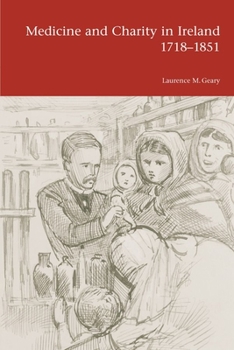Medicine and Charity in Ireland 1718-1851
In this illuminating social history of medicine and charity in Ireland over almost 150 years from 1718 until just after the Great Famine, Laurence M. Geary shows how illness and poverty reacted upon each other. The poverty resulting from great population growth that continued until the arrival of potato blight in 1845 had a severe effect on the health of the country's population, and the Famine itself caused around one million deaths from starvation and disease. This was a period of great change in medical and charitable services. In the eighteenth century the sick had come to be regarded as the deserving poor, therefore having a better claim to public assistance than those whose poverty was the result of their own dissipation, idleness or vice. A network of charities evolved in Ireland to provide free medical aid to the sick poor. The first voluntary hospital in Dublin opened in 1718 and Geary traces the establishment and development of voluntary hospitals and county infirmaries throughout the country.These had a strong Anglican ethos and bias, but after Catholic emancipation in 1829 the nepotism, sectarianism and divisive politics that were rife in these organisations came under increasing scrutiny. Medical practitioners saw considerable progress in the development of a regulated profession. Geary describes developments in policy making and legislation, culminating in the 1851 Medical Charities Act, which he describes as part of a process that characterised the century and more under review in this book: the unrelenting pressure on philanthropy and private medical charity and the inexorable shift from voluntarism to an embryonic system of state medicine.
Format:Hardcover
Language:English
ISBN:1904558178
ISBN13:9781904558170
Release Date:August 2004
Publisher:University College Dublin Press
Length:241 Pages
Weight:1.25 lbs.
Dimensions:1.3" x 6.2" x 9.3"
Customer Reviews
0 rating





